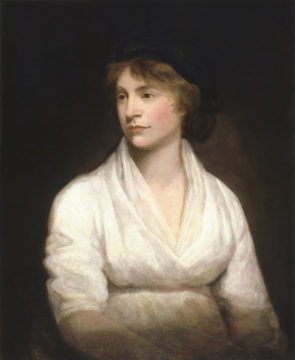Robert Zaretsky at The American Scholar:
 To vindicate indicates one of two aims: to make a defense or to stake a claim. With the Vindication of the Rights of Men, published in 1790, Wollstonecraft upheld the natural rights of man, a notion enthroned by the revolutionaries in their “Declaration of the Rights of Man,” embraced by Thomas Paine in his fiery pamphlet Rights of Man, and excoriated by Burke in his Reflections. Two years later, though, and to the shock of her critics, Wollstonecraft pivoted from defense to offense—in both senses of the word—by making a jaw-dropping claim. Natural rights, she declared, also belong to the other half of humankind: women. “I love man as my fellow,” she proclaimed in the Vindication of the Rights of Woman, “but his sceptre, real or usurped, extends not to me, unless the reason of an individual demands my homage.” Wollstonecraft was not alone in making so extraordinary a claim. The following year in France, the playwright Olympe de Gouges published her Declaration of the Rights of Woman. Demanding full civil and political rights for both sexes, de Gouges insisted that a woman’s place in the public square was side by side, as a full equal, to man.
To vindicate indicates one of two aims: to make a defense or to stake a claim. With the Vindication of the Rights of Men, published in 1790, Wollstonecraft upheld the natural rights of man, a notion enthroned by the revolutionaries in their “Declaration of the Rights of Man,” embraced by Thomas Paine in his fiery pamphlet Rights of Man, and excoriated by Burke in his Reflections. Two years later, though, and to the shock of her critics, Wollstonecraft pivoted from defense to offense—in both senses of the word—by making a jaw-dropping claim. Natural rights, she declared, also belong to the other half of humankind: women. “I love man as my fellow,” she proclaimed in the Vindication of the Rights of Woman, “but his sceptre, real or usurped, extends not to me, unless the reason of an individual demands my homage.” Wollstonecraft was not alone in making so extraordinary a claim. The following year in France, the playwright Olympe de Gouges published her Declaration of the Rights of Woman. Demanding full civil and political rights for both sexes, de Gouges insisted that a woman’s place in the public square was side by side, as a full equal, to man.
more here.
